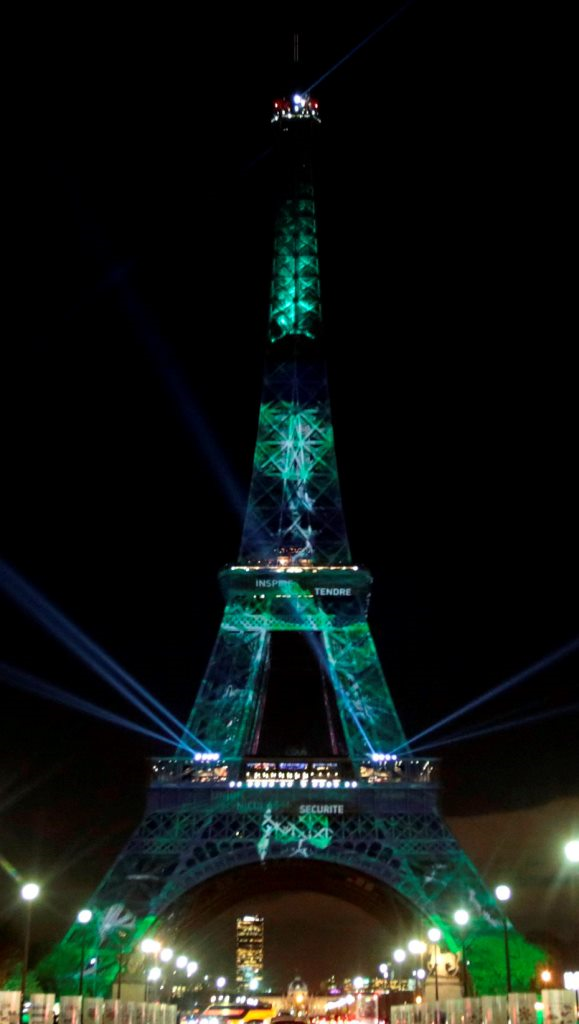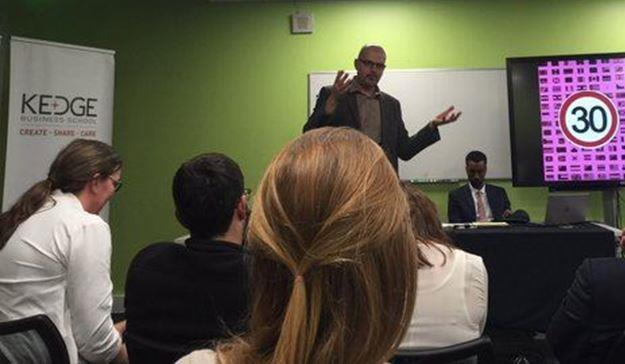The following blogs are reflections on the group’s experiences in Marrakech and at COP22:
Message from COP22: KEEP CALM and Keep Fighting the Good Fight! Oksan Bayulgen and Rich Miller
Signs of Hope Throughout Marrakech Brooke Siegel
A Remarkable Learning and Cultural Experience Genevieve Nuttall
There is Hope in the Human Spirit Margaux Verlaque-Amara
Back to Nature, Where it All Started Wyatt Million
Message from COP22: KEEP CALM and Keep Fighting the Good Fight!
Oksan Bayulgen, Associate Professor of Political Science, Faculty Director of UConn’s Global House
Rich Miller, Director, UConn Office of Environmental Policy & Sustainability
Only a few days after the historical elections in the United States, we set out to North Africa to attend the U.N.’s international conference on climate change. COP22 was supposed to be a relatively straightforward, low-key conference a year after the monumental Paris Agreement had emerged from COP21. The goal was to take stock of the progress each country has made so far and flesh out the remaining challenges in the implementation of the national pledges.
Instead, this goal was overshadowed by the unexpected turn of events in the U.S., with the improbable election of Donald J. Trump to the presidency. Given his climate change denialism and explicit rejection of the Paris Agreement (in addition to many other statements in favor of the fossil fuel industry), there were genuine concerns that the hard fought achievements of the previous year would be reversed with a possible withdrawal of the U.S. from the historical agreement. When we landed in Marrakesh, Morocco, we found ourselves right in the middle of that pervasive sense of doom and gloom.
To be honest, on our first day in Marrakesh, we were very pessimistic as well. Based on our combined years of experience, whether it’s conducting research and teaching various classes on the politics of energy, or working to develop environmental and sustainability programs at UConn or in the corporate world, we have come to appreciate the critical importance of leadership and an institutional balance of power in designing and implementing environmentally friendly policies. Even in a democracy like that of the U.S., where there are strong checks and balances, a president singlehandedly has a lot of power to affect and change the course of policy in the years to come. It would be naïve and uninformed to assume that the path of progress that was set by an outgoing president could not be reversed by a new president.

Yet, as the week went by, seeing and interacting with some of the passionate and committed “foot soldiers” of this environmental movement, we started to relax and see the glass half full. There are three main reasons why we are more hopeful now.
First of all, even though anti-globalization forces have gained ground and popularity in the U.S. and elsewhere in the world in recent years, it is clear to us that COPs in many ways represent the best of globalization. They prove that there are no national boundaries, no walls, and no cultural differences when it comes to the aspiration to find solutions to a truly global challenge such as climate change. These conferences are the best and most hopeful responses to the isolationist and xenophobic calls that we have come to see in many countries around the world. They reinforce the belief that we are not alone in this world in our fight against dark forces that want to reverse progress.
[COPs] prove that there are no national boundaries, no walls, and no cultural differences when it comes to the aspiration to find solutions to a truly global challenge such as climate change.
Secondly, the fact that COP22 took place in Morocco, a developing country with many economic challenges of its own, in and of itself, sends a hopeful message. One of the themes of this meeting was the synergy between sustainable development goals and climate action. The clear message was that policies to fight climate change could be successful only if they also provide economic and social benefits to communities and respect the rights of vulnerable, marginalized groups. Or put differently, countries do not need to choose between economic development and the environment. It is not a zero sum game. Concerns about economic insecurity need not trump anxieties about environmental insecurity. Sustainability requires us to think of these two as complementary and as reinforcing each other. To us, the location of this COP and the excitement and commitment of so many delegations from developing countries, especially in Africa, proved unequivocally that the momentum of Paris cannot be reversed. With or without the U.S., the Paris accord will live on.
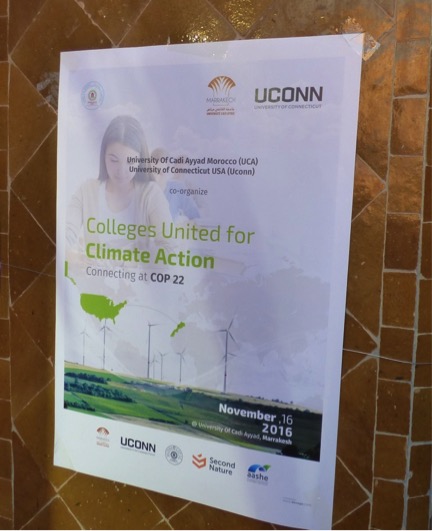
Finally, in the course of a week, we witnessed among our students (as well as millions more in the U.S. and around the world) the transformation of the post-election blues into a fresh determination and commitment to keep fighting. We think (and hope) that this setback will motivate and empower younger generations to participate in the decision-making processes at local and national levels, in the plethora of ways that our democracy offers. And, as demonstrated by dozens of students, from Morocco’s Cadi Ayyad University, UConn and several other American universities, who spoke at the higher education networking event, Colleges United For Climate Action, there are more that unite than divide the younger generations around the world. Climate change is the defining and unifying challenge of our times and the millennials are all in!
Overall, this was an amazing trip! Beautiful Marrakesh was the backdrop to the great new friendships we formed and the new networks we established. This trip also proved, once again, the importance of experiential learning. Outside the traditional classroom setting, we were able to see, breathe, feel climate change and learn about the innovations, and policy solutions that real bureaucrats, corporations, and civil society organizations bring to the table. Last year in Paris and again this year in Marrakesh, history was made and we were there to witness it!
UConn needs to continue this participation in future COPs, and other colleges and universities should engage as well. Now more than ever, higher education needs to lead by example on the myriad science, policy and human rights issues surrounding climate change. We are all better for having attended this conference.
And now… we need to keep calm and keep fighting the good fight!
Signs of Hope Throughout Marrakech
Brooke Siegel, Student, Environmental Studies, Urban and Community Studies
The second that we boarded our Royal Air Maroc flight to Morocco, the COP22 logo was plastered everywhere we looked: painted on the fuselage of the airplane and printed on every seat cover. When we got off of the flight in the Marrakesh airport we could not walk more than 10 feet without seeing a COP22 sign, logo, or environmental message. Many people stopped us in the airport to ask if we were attending the conference as well. In the city itself, COP22 was carved into the landscaped gardens and a sign was hanging from every streetlight, including a call for climate action in multiple languages.
To me, this was both exciting and refreshing to see that the importance of the environment was being advertised and publicly displayed for all to see. Even with these signs everywhere, I found myself skeptical that the local people of Marrakesh actually understood the significance of COP22, apart from bringing big-spending tourists into this very entrepreneurial city. Maybe they were aware that it was an environmental conference and that we were talking about the importance of mitigating climate change. But what does that really mean to them? Did they understand the implications of a warming climate on their daily lives?
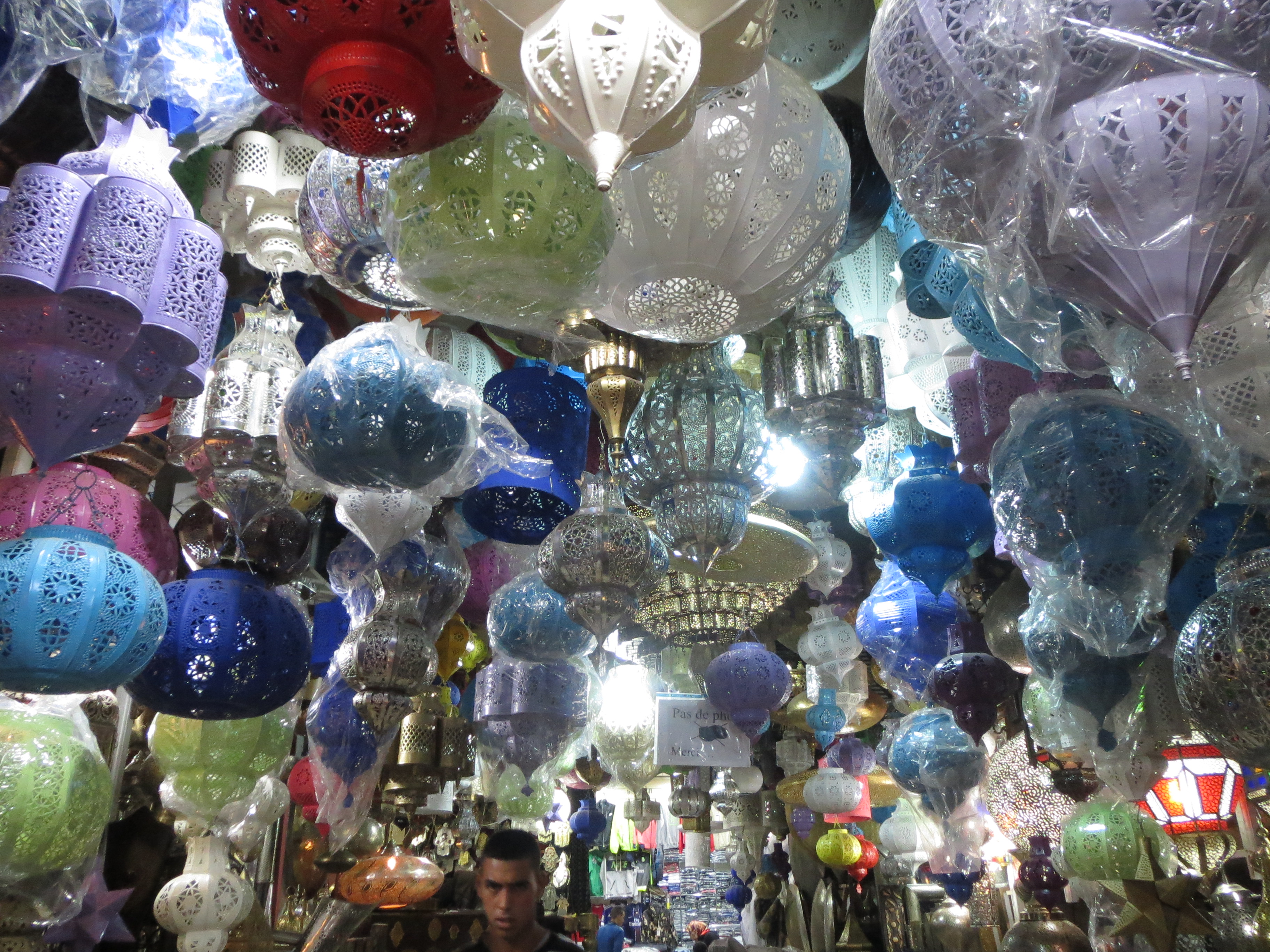
On the second day of the trip, my questions were partially answered at the Green Zone and later, after visiting the market. After lots of searching and negotiating, I picked out a lantern to purchase from a local vendor. The man I purchased it from saw that I had a bag already hanging from my arms and said in broken English something like, “Put the lantern in the bag you already have. We must recycle to help the environment.” For me, this was a very eye-opening and refreshing experience. It made me extremely hopeful that COP 22’s message is spreading beyond the walls of the conference. Maybe this was just an isolated experience and the vast majority do not fully understand climate change, but it is a vision of hope for our future and the future of our planet. I am optimistic that it is not just the formally educated individuals attending this conference who understand the importance of saving the planet for future generations.
A Remarkable Learning and Cultural Experience
Genevieve Nuttall, Student, Ecology and Evolutionary Biology, Conservation Biology and Biodiversity
The COP22 experience was remarkable. Even though we were in Marrakech for only five days, we met many interesting people, saw many wonderful sights, and listened to many inspiring and informed presentations on climate change issues from international delegates.
At the COP conference, I had the opportunity to learn about a variety of topics, such as sustainable agriculture, electric vehicles, and women’s rights, and how climate change impacts these subjects. It was interesting to interact and learn from people who came to COP22 from distant continents, like nations as far apart as Costa Rica and Kenya or the US and Senegal. Despite the differences in backgrounds and perspectives, it was reassuring to know that so many people around the world are united in the search for common solutions to climate-related problems, and passionate about preserving a sustainable future.
 COP22 was held in Marrakech, a bustling and exciting city in the North African country of Morocco. We explored the city on the first night and had the chance to watch painters create a mural portraying climate change and a group performing traditional Moroccan dances. I enjoyed the cultural experience of our tour through the city, especially the food, which included some incredible vegetable dishes, olives, and tea.
COP22 was held in Marrakech, a bustling and exciting city in the North African country of Morocco. We explored the city on the first night and had the chance to watch painters create a mural portraying climate change and a group performing traditional Moroccan dances. I enjoyed the cultural experience of our tour through the city, especially the food, which included some incredible vegetable dishes, olives, and tea.
I loved learning about and discussing the problems and solutions related to climate change, and I’m optimistic about the future of our Earth after listening to all of the great ideas posed by delegates at the COP. Although combatting climate change will be difficult, I left Marrakech knowing we have the commitment and tools to make it possible.
The COP22 conference was spectacular, and I am so happy that I was able to have this experience. In the second half of the week, I attended panel sessions on biodiversity, sustainable agriculture, and food security. I really enjoyed all of the talks on agriculture and this topic inspired me to continue studying conservation biology and its integration into agriculture. I found that the delegates speaking about farming were the most passionate and made the audience excited and hopeful. I was a little disappointed by the biodiversity speakers because they seemed disinterested when they spoke and didn’t emphasize the importance of biodiversity and how it goes hand in hand with climate change. But the conference as a whole was incredible. I spread the word about the conference using social media such as Facebook and Twitter, and people seemed excited to learn about what was happening in Marrakech.
 I loved meeting the students from the University of Cadi Ayyad in Marrakech, during the networking event that UConn helped plan and co-sponsored with our Moroccan hosts. It was inspiring to listen to their ideas and see their innovations to promote the sustainability of their University community. We were able to exchange contact information to keep in touch in the future, which was exciting.
I loved meeting the students from the University of Cadi Ayyad in Marrakech, during the networking event that UConn helped plan and co-sponsored with our Moroccan hosts. It was inspiring to listen to their ideas and see their innovations to promote the sustainability of their University community. We were able to exchange contact information to keep in touch in the future, which was exciting.
My favorite activity other than the COP itself was visiting the Atlas Mountains. From our hotel, we were able to see the silhouette of the mountains, and I am so glad we were able to drive to them and hike up to a waterfall that fed a river that ran through the communities in the mountains. At the top of the mountain, we had mint tea at a little café right next to the waterfall. This experience was a great way to end such an amazing trip to Morocco.
There is Hope in the Human Spirit
Margaux Verlaque-Amara, Student, Molecular and Cell Biology
It started with the security guard patrolling the TSA line. He slowly walked down the line, smiling and greeting those as he went. When he stopped at us, we exchanged greetings. We got to talking, and I asked him if he had ever been to Morocco. He said no, but mentioned he would love to someday. I told him that our group was attending the UN Climate Conference, and his face instantly lit up. He said to me, “I can’t believe that some people can deny that climate change exists, young people like you have to go out there and make some change, for us, our kids, our grandkids.” In the first leg of our long trip to COP22, I had already encountered this profound idea that the safety of our Earth knows no borders, but still, some are not compelled to believe or pay attention to the rapidly changing world around them. Why is that? That’s a complex idea, one wrapped up in politics and social circles and privilege. But what is even more interesting to me is that one of the first interactions outside of the sphere of my fellow classmates and professors was with a security guard, and he had a felt the same gravity and urgency we all felt as we were embarking on this journey.
The topic of climate change is not just for liberal ideological spheres, it is for everyone simply because it affects everyone in some capacity. Everyone should engage in these conversations whenever they are able to. Especially in the current political climate that is divided between the advocates and the skeptics, engagement in thoughtful and evidence-based conversation is crucial. I responded to the guard by saying, “Well you can be a change too, ya know?” By just urging others to pay attention to your environment, I said, you are already doing more than a lot of other people. He agreed with a smile on his face, and told us good luck as we continued on down the line.
Speaking of political climate, we are definitely in the depths of a drastic shift in political influence in the United States. And, for most of my fellow classmates and professors, we don’t see the change as a positive one. We can argue about how to best improve healthcare insurance, or how to reform the tax system, but we cannot get around the fact that our Earth is changing very rapidly, and we cannot dispute the overwhelming evidence that shows humans are contributing to this. But the topic of climate change has been devalued and rejected throughout the entirety of our recent presidential election in favor of possible economic prosperity and job security (although sustainability-related industries can easily support a prosperous economy, but that’s a different discussion).
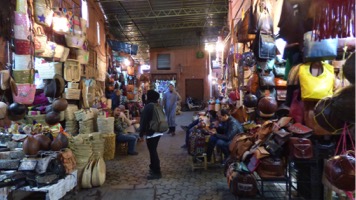
I met a man deep in the famous Marrakech markets who spoke to me about the election. A small group of us were wandering the tightly packed stalls filled to the brim with the best of Moroccan goods when we met. As we browsed along a wall of leather bags, the man and I got to talking and he asked what we thought of our newly elected president, Donald Trump. Trump is an open climate change skeptic, so, along with his other disagreeable rhetoric and behavior, the COP22 group definitely has reason to be concerned for the future of our climate policies. However, the man in the market, who is a Brazilian living in Canada, had his own opinion about our new leader. He said, “Well, I know he is racist and not the best qualified, but I have a strong feeling he will do good things for the middle class which is so bad right now.” I was absolutely intrigued because it seemed that his stance had nothing to do with the facts or policy of Trump’s campaign, but it had everything to do with this idea of personal financial gain. I changed the topic and said, “What about the fact that he doesn’t believe in climate change?” This did not seem to dissuade the man in the market at all, as he waved his hand in the air and said that kind of thing does not matter. HUH?! I responded with a few one liners that I’ve perfected since the election but, to my dismay, the man was not budging. Now I don’t know this man’s whole back story, but what I got from him was this: many people will go to any length to see change in personal status, no matter what other baggage their vote has. And this makes sense if you think about it – we are all trying to survive out here. But what is surviving if you are stepping over other types of survival in the process?
This man didn’t even vote in the U.S. election, but in the midst of growing global populism, he gets lost in the jibber-jabber of false promises and exploited ideas, a problem many Americans had at the polling station this past election. Unfortunately, climate change policy got lost somewhere along the line because a personal connection was not made for most people. What will it take to make that personal connection with the threat of climate change? How is it too abstract for some folks like the Brazilian-Canadian, yet an imminent threat to a random TSA security guard? Maybe exposure, maybe privilege, maybe a different set of values.
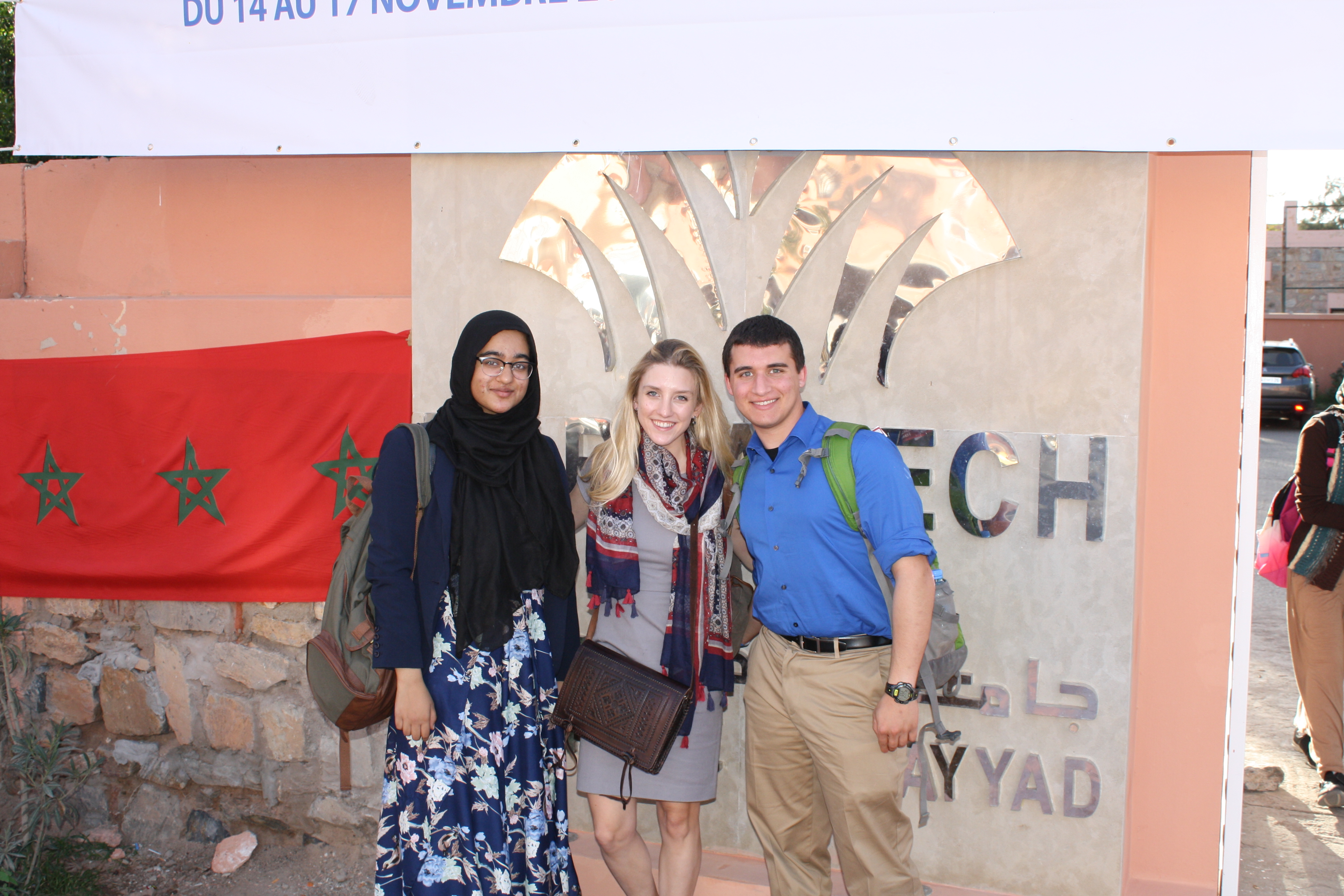
So here we are, a bunch of American students in Morocco, trying to make sense of how our values and hopes collide with the rest of the world’s. But at our cores, we humans are not all that different from one another no matter where we are from; and if this trip taught me anything, it is that exactly. We try our best to make the right choices for ourselves and the people we love. For instance, Muhammad, the man who served us delicious tagine and warm bread on the cramped city street, lives his life day to day and makes enough to sustain what he already has. He talked about Morocco’s corrupt health system where if you can’t pay, you die, and how important it is to just keep working no matter what. And Salema, the belly dancer we met in the desert restaurant, who left an abusive marriage and lives to support herself in a world where it is difficult for a woman to make it on her own. These are the people of the world, they are trying to do their best with the tools they are given, and it leaves little room for the nuance that we American college students have the luxury of contemplating. Where does climate change advocacy fit into the life of the average human who has to worry about a multitude of other things just in order to survive?
I still have so many questions floating around my mind after this trip. But if there is one thing I know now, it is that I believe in the power of the human spirit. I believe there is strength in knowledge and urgency, and if the right voices were talking, humans would come together to change our world. Of course it is complicated, and there are powerful and corrupt leaders who put personal gain over the lives of others. Every structure that is built into our daily lives need to see a change, the table needs to be restructured so the common person’s voice is heard. Yet, there is strength in numbers, and if you give people the right political and industry support, the right knowledge, and the right incentive, the threat of climate change can be at the forefront of their lives, and we can all move towards a better world together.
Back to Nature, Where it All Started
Wyatt Million, Student, Biological Sciences
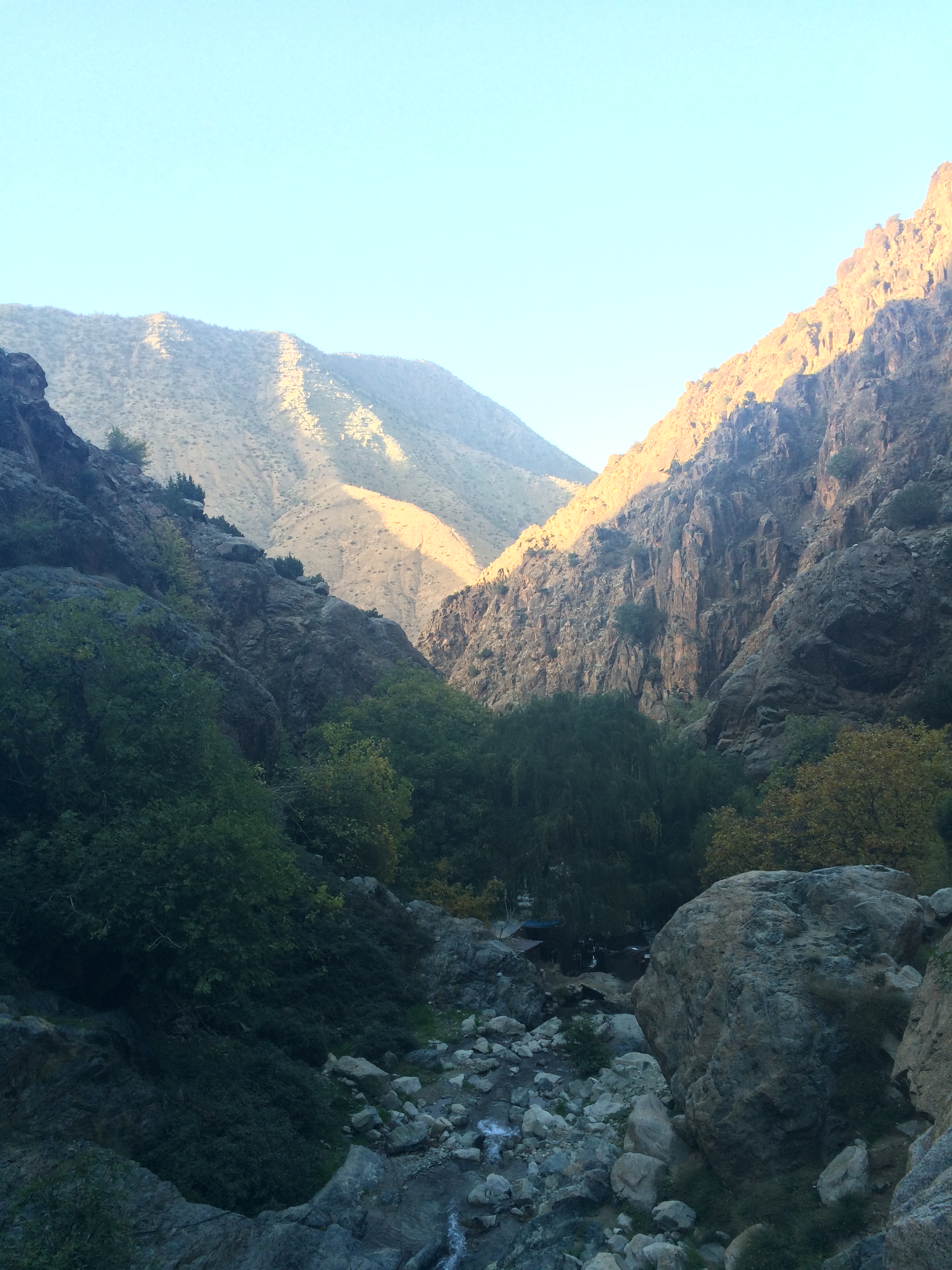
The last UConn@COP22 activity of our trip to Morocco brought me back to where my passion for the environment all began. The final afternoon and evening in Marrakesh were spent on an excursion to the snow-capped Atlas Mountains, which rise out of the desert terrain about an hour south of the city limits. After the driver parked our shuttle bus cliff side, rather precariously for some in our group, we met Mohamed, our enthusiastic mountain guide. He expertly led us on a walk that turned into a hike, that eventually turned into a climb, with several stops along the way to rest, admire the beautiful vistas, and purchase various local items.
We started by crossing a river and then weaved our way through shops and homes to follow a small stream up the side of a mountain. The small stream started to become more powerful but, as the elevation increased, so did the difficulty of the terrain, causing the group to hop across rocks and scamper up boulders. Nearing the top, we encountered the first waterfall, an impressive rush of crystal clear water down a 20-foot boulder, but it was relatively small compared to what was above.
After more hiking and climbing, we arrived at the highest waterfall, at least 50-feet tall, pouring glacial water down into a shallow, clear pool. I caught myself hypnotized by the power and sound of the falling water, and as I turned to look at the mountain range behind us, a type of euphoria sent me back to my childhood. As I waded into the cold water and stood beneath the falls for a few seconds, it literally took my breath away.
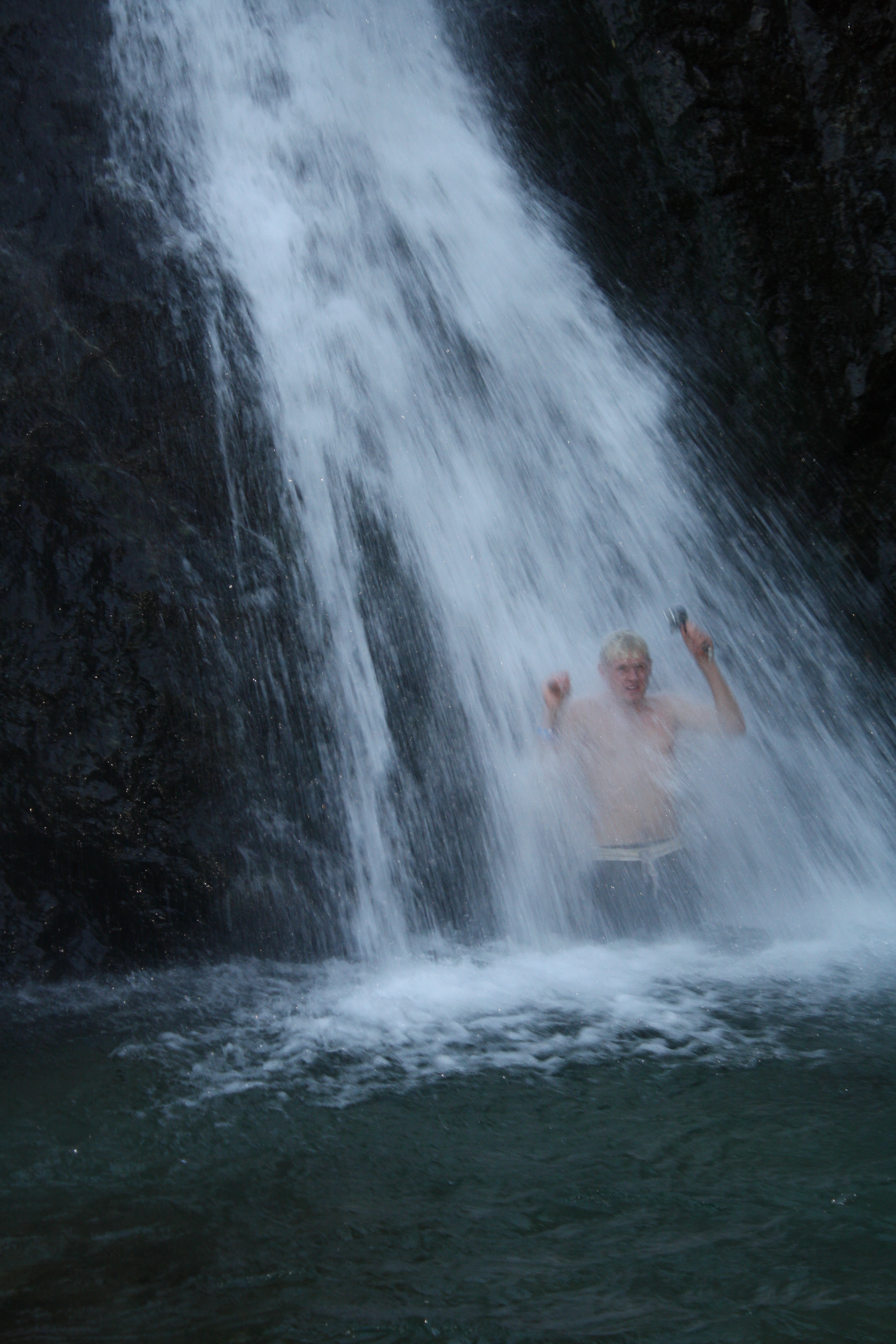
For me, the outdoors has been more than a place for hiking or fresh air or taking cool pictures, it is more of a home. The environment has been a vital part of my life growing up, so being in such a beautiful place took me back to when I first realized that I would do anything to protect it. Because I was so affected by the outdoors as a child, my enthusiasm has been growing nearly 15 years and has been focused now on protecting ecosystems and conserving natural resources. COP22 provided me with more direction for my future but the Atlas Mountains reignited my most basic connection with the environment.
My access to the outdoors as a child led to my love of nature and, later, to my involvement in environmental issues and decision to pursue a degree in the Biological Sciences at UConn. And I believe this experiential learning could reign true for future generations. Providing children with the opportunity to experience first-hand the effects of climate change will do more than just explaining the science to them. It is one thing to understand climate change and another to care enough to do something about it. Being in those mountains reminded me of exploring in my backyard and family vacations to the Adirondack Mountains. It reminded me of what is at stake in the fight against climate change.


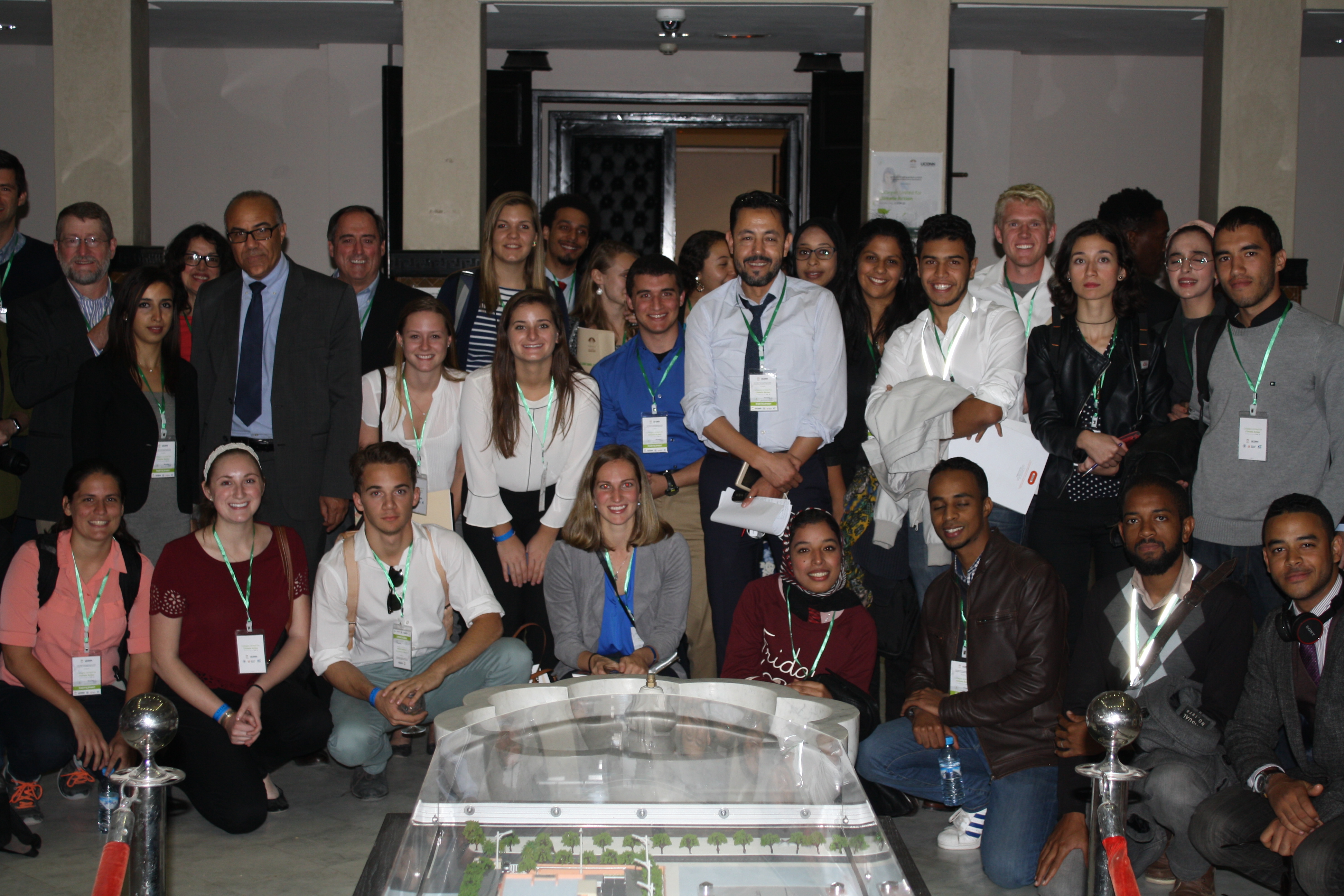
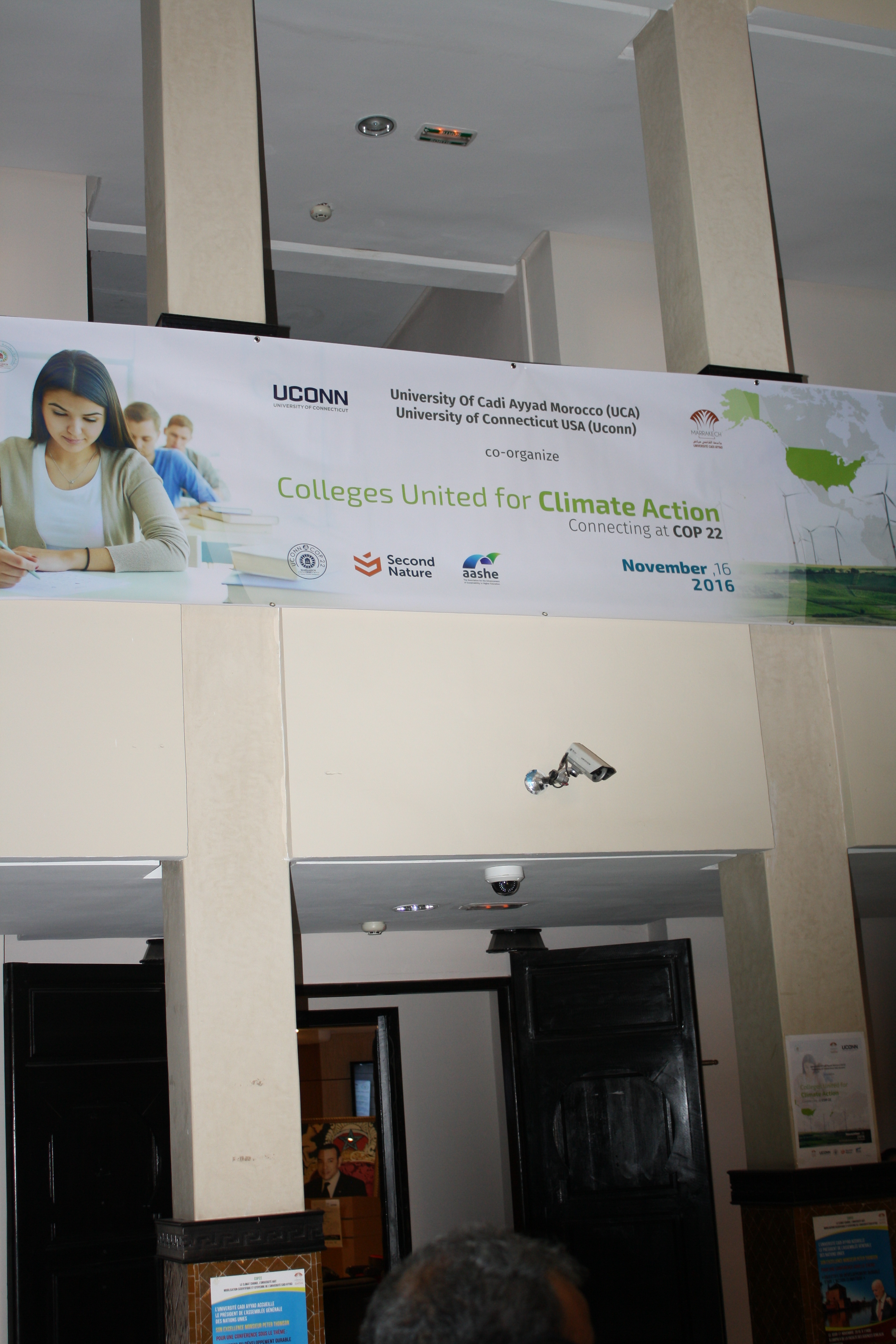
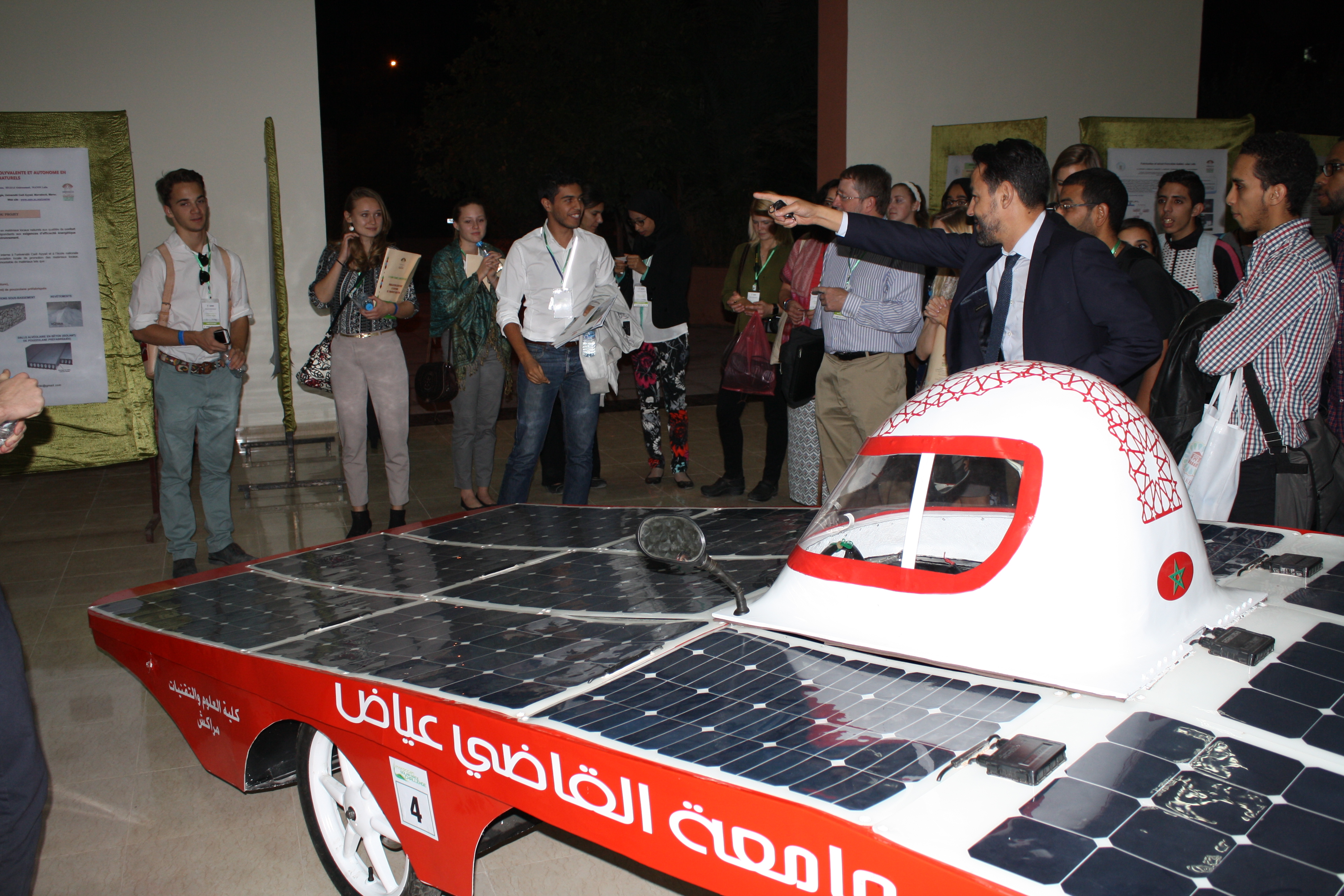
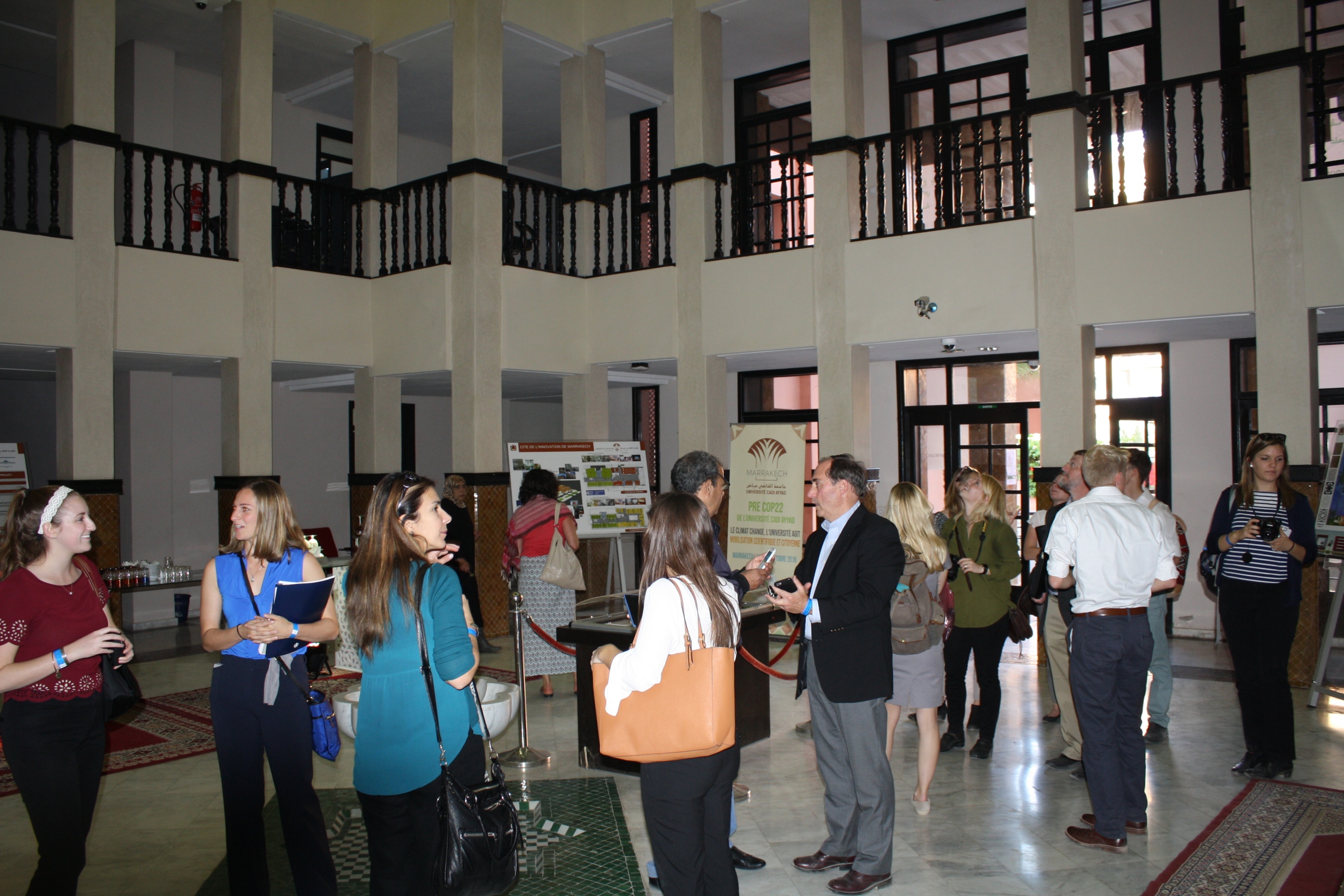



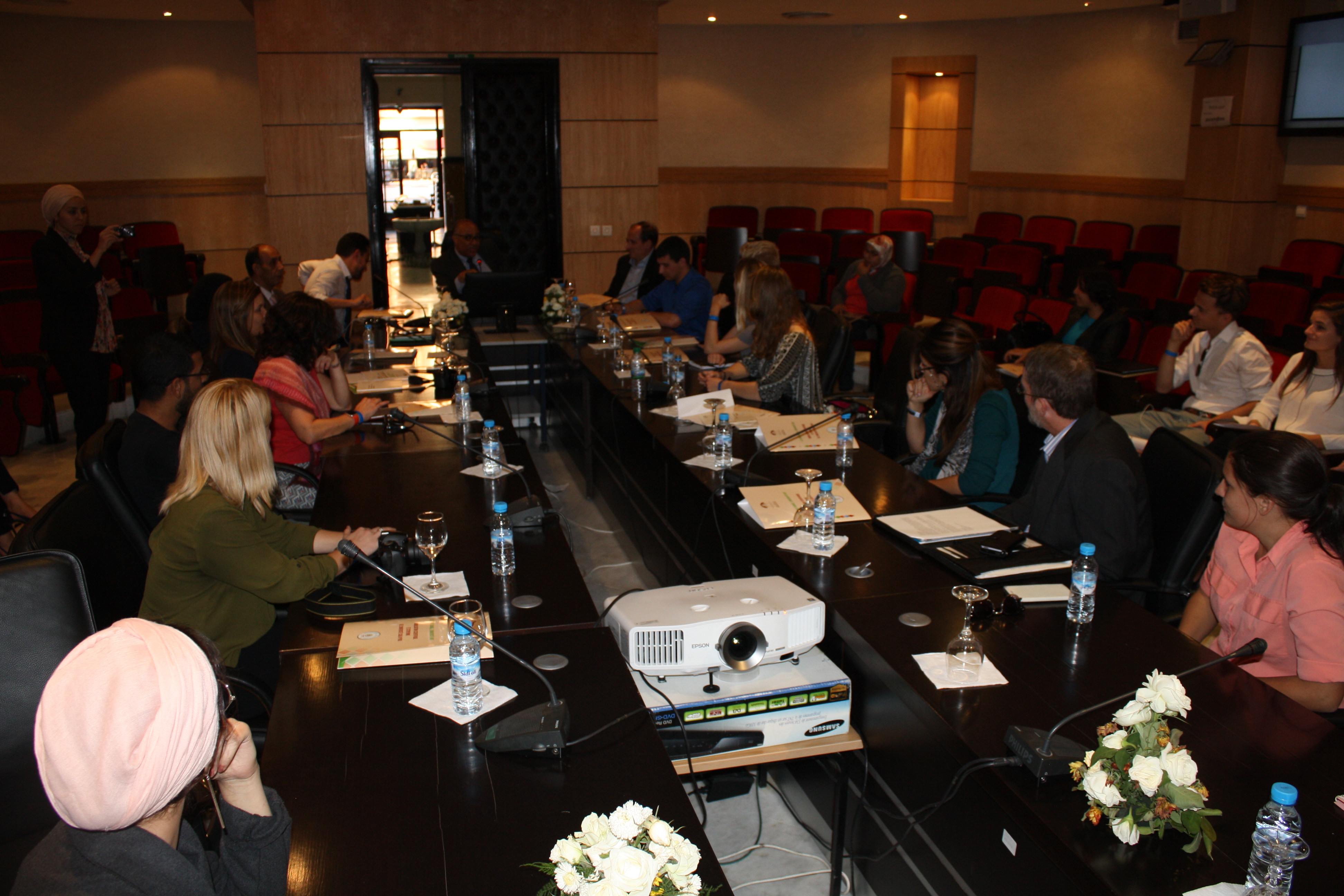



 There is a lull in the conversation. Ben Breslau, a fellow student from the UConn group, asks “So what do we do?” Mostafa emphatically replies, “You wait. Please wait. You do nothing. You have patience,” almost pleading for the new US administration to stand behind the Paris Agreement, reached just last year at the historic COP21. He cares what we do. He cares because it affects him too.
There is a lull in the conversation. Ben Breslau, a fellow student from the UConn group, asks “So what do we do?” Mostafa emphatically replies, “You wait. Please wait. You do nothing. You have patience,” almost pleading for the new US administration to stand behind the Paris Agreement, reached just last year at the historic COP21. He cares what we do. He cares because it affects him too. I shuffled in and out of shops trying to find a souvenir in Marrakech when one merchant turned to me, chuckled and asked “you voted for Trump?” I was confused and slightly embarrassed that this election was following me deep into the Souks of the Medina, but I was not surprised. In fact, before that encounter, most panel discussions I attended at COP22 mentioned the election results back home, which named Donald Trump as our president-elect. Throughout the campaign, Trump argued that climate change is merely a hoax spurred by the Chinese and criticized the United States for spending money on environmental initiatives to minimize its effects. He had threatened to dismantle last year’s landmark Paris Agreement, and Trump and revoke the Obama Administration’s Clean Power Plan, which calls for a decrease in carbon emissions from power plants.
I shuffled in and out of shops trying to find a souvenir in Marrakech when one merchant turned to me, chuckled and asked “you voted for Trump?” I was confused and slightly embarrassed that this election was following me deep into the Souks of the Medina, but I was not surprised. In fact, before that encounter, most panel discussions I attended at COP22 mentioned the election results back home, which named Donald Trump as our president-elect. Throughout the campaign, Trump argued that climate change is merely a hoax spurred by the Chinese and criticized the United States for spending money on environmental initiatives to minimize its effects. He had threatened to dismantle last year’s landmark Paris Agreement, and Trump and revoke the Obama Administration’s Clean Power Plan, which calls for a decrease in carbon emissions from power plants. Either way, this election left many delegates and panelists concerned and unsure about the future of our world. I spoke with a panelist from GIZ, Klaus Wenzel, about the U.S.’s resistance of climate change policy. He talked about how workers are concerned about how they will be affected by this transition to things like clean energy. “People are afraid,” he said. “People are afraid of what this means for their jobs.” One of Trump’s main issues with renewable energy is that it is too expensive. Wenzel argued that although the return on investment takes time, renewable energy decreases the amount of air pollution and green house gas emissions, both of which have major effects on the environment and human health. “What is the worth of a premature death?”
Either way, this election left many delegates and panelists concerned and unsure about the future of our world. I spoke with a panelist from GIZ, Klaus Wenzel, about the U.S.’s resistance of climate change policy. He talked about how workers are concerned about how they will be affected by this transition to things like clean energy. “People are afraid,” he said. “People are afraid of what this means for their jobs.” One of Trump’s main issues with renewable energy is that it is too expensive. Wenzel argued that although the return on investment takes time, renewable energy decreases the amount of air pollution and green house gas emissions, both of which have major effects on the environment and human health. “What is the worth of a premature death?”
 Let’s hear it for the US’s decision to join the world’s most economically-powerful and globally-engaged nations in approving this
Let’s hear it for the US’s decision to join the world’s most economically-powerful and globally-engaged nations in approving this 